Entrepreneurship: Ventures, Economic Impact, and Success Traits
VerifiedAdded on 2023/01/03
|14
|3903
|27
Report
AI Summary
This report provides a comprehensive analysis of entrepreneurial ventures, focusing on their different types, including small business, social, innovative, and imitator entrepreneurs. It explores the similarities and differences between these ventures, examining their scale, purpose, and approach to meeting customer needs. The report assesses the economic impact of micro and small businesses, highlighting their contribution to employment and the overall economy. It also explains the importance of small businesses and start-ups in driving the growth of the social economy. Furthermore, the report identifies and analyzes the characteristics, skills, and traits of successful entrepreneurs, differentiating them from other business managers, and examines how entrepreneurial personalities reflect mindset and motivation. Finally, it investigates how background and experience can both hinder and foster entrepreneurship, providing relevant examples to illustrate these points.

ENTREPRENEURES
AND SMALL
BUSINESS
1
AND SMALL
BUSINESS
1
Paraphrase This Document
Need a fresh take? Get an instant paraphrase of this document with our AI Paraphraser
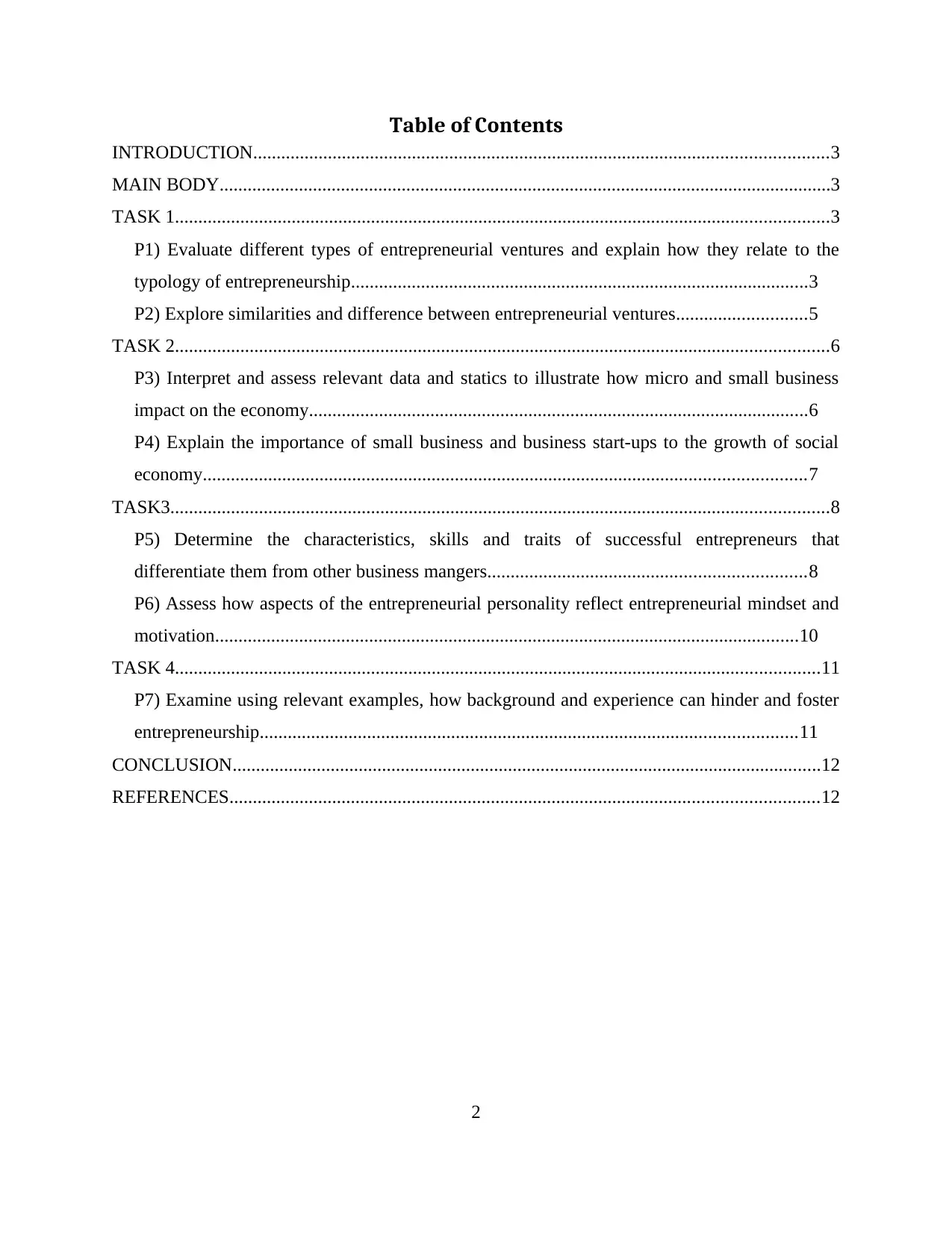
Table of Contents
INTRODUCTION...........................................................................................................................3
MAIN BODY...................................................................................................................................3
TASK 1............................................................................................................................................3
P1) Evaluate different types of entrepreneurial ventures and explain how they relate to the
typology of entrepreneurship..................................................................................................3
P2) Explore similarities and difference between entrepreneurial ventures............................5
TASK 2............................................................................................................................................6
P3) Interpret and assess relevant data and statics to illustrate how micro and small business
impact on the economy...........................................................................................................6
P4) Explain the importance of small business and business start-ups to the growth of social
economy.................................................................................................................................7
TASK3.............................................................................................................................................8
P5) Determine the characteristics, skills and traits of successful entrepreneurs that
differentiate them from other business mangers....................................................................8
P6) Assess how aspects of the entrepreneurial personality reflect entrepreneurial mindset and
motivation.............................................................................................................................10
TASK 4..........................................................................................................................................11
P7) Examine using relevant examples, how background and experience can hinder and foster
entrepreneurship...................................................................................................................11
CONCLUSION..............................................................................................................................12
REFERENCES..............................................................................................................................12
2
INTRODUCTION...........................................................................................................................3
MAIN BODY...................................................................................................................................3
TASK 1............................................................................................................................................3
P1) Evaluate different types of entrepreneurial ventures and explain how they relate to the
typology of entrepreneurship..................................................................................................3
P2) Explore similarities and difference between entrepreneurial ventures............................5
TASK 2............................................................................................................................................6
P3) Interpret and assess relevant data and statics to illustrate how micro and small business
impact on the economy...........................................................................................................6
P4) Explain the importance of small business and business start-ups to the growth of social
economy.................................................................................................................................7
TASK3.............................................................................................................................................8
P5) Determine the characteristics, skills and traits of successful entrepreneurs that
differentiate them from other business mangers....................................................................8
P6) Assess how aspects of the entrepreneurial personality reflect entrepreneurial mindset and
motivation.............................................................................................................................10
TASK 4..........................................................................................................................................11
P7) Examine using relevant examples, how background and experience can hinder and foster
entrepreneurship...................................................................................................................11
CONCLUSION..............................................................................................................................12
REFERENCES..............................................................................................................................12
2
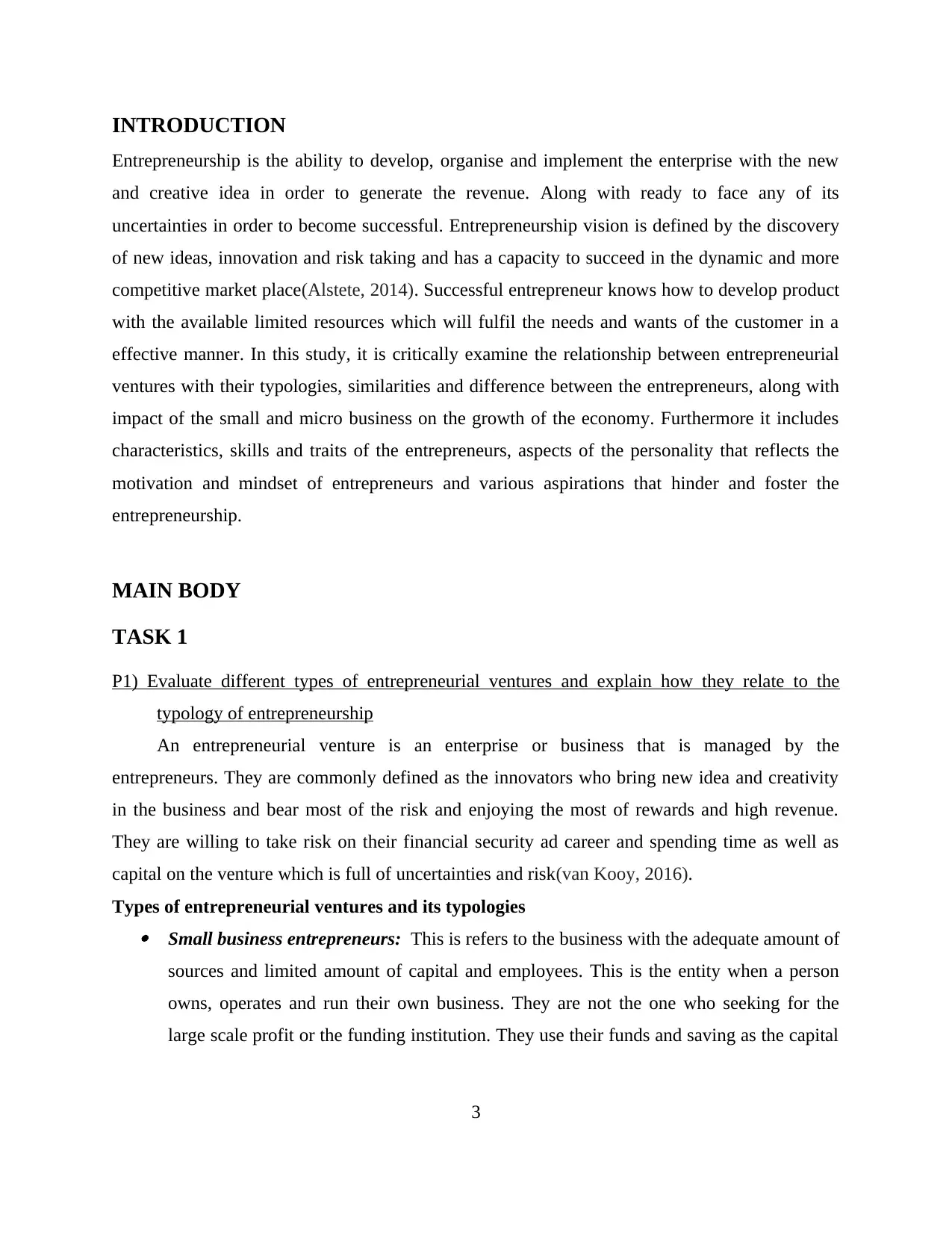
INTRODUCTION
Entrepreneurship is the ability to develop, organise and implement the enterprise with the new
and creative idea in order to generate the revenue. Along with ready to face any of its
uncertainties in order to become successful. Entrepreneurship vision is defined by the discovery
of new ideas, innovation and risk taking and has a capacity to succeed in the dynamic and more
competitive market place(Alstete, 2014). Successful entrepreneur knows how to develop product
with the available limited resources which will fulfil the needs and wants of the customer in a
effective manner. In this study, it is critically examine the relationship between entrepreneurial
ventures with their typologies, similarities and difference between the entrepreneurs, along with
impact of the small and micro business on the growth of the economy. Furthermore it includes
characteristics, skills and traits of the entrepreneurs, aspects of the personality that reflects the
motivation and mindset of entrepreneurs and various aspirations that hinder and foster the
entrepreneurship.
MAIN BODY
TASK 1
P1) Evaluate different types of entrepreneurial ventures and explain how they relate to the
typology of entrepreneurship
An entrepreneurial venture is an enterprise or business that is managed by the
entrepreneurs. They are commonly defined as the innovators who bring new idea and creativity
in the business and bear most of the risk and enjoying the most of rewards and high revenue.
They are willing to take risk on their financial security ad career and spending time as well as
capital on the venture which is full of uncertainties and risk(van Kooy, 2016).
Types of entrepreneurial ventures and its typologies Small business entrepreneurs: This is refers to the business with the adequate amount of
sources and limited amount of capital and employees. This is the entity when a person
owns, operates and run their own business. They are not the one who seeking for the
large scale profit or the funding institution. They use their funds and saving as the capital
3
Entrepreneurship is the ability to develop, organise and implement the enterprise with the new
and creative idea in order to generate the revenue. Along with ready to face any of its
uncertainties in order to become successful. Entrepreneurship vision is defined by the discovery
of new ideas, innovation and risk taking and has a capacity to succeed in the dynamic and more
competitive market place(Alstete, 2014). Successful entrepreneur knows how to develop product
with the available limited resources which will fulfil the needs and wants of the customer in a
effective manner. In this study, it is critically examine the relationship between entrepreneurial
ventures with their typologies, similarities and difference between the entrepreneurs, along with
impact of the small and micro business on the growth of the economy. Furthermore it includes
characteristics, skills and traits of the entrepreneurs, aspects of the personality that reflects the
motivation and mindset of entrepreneurs and various aspirations that hinder and foster the
entrepreneurship.
MAIN BODY
TASK 1
P1) Evaluate different types of entrepreneurial ventures and explain how they relate to the
typology of entrepreneurship
An entrepreneurial venture is an enterprise or business that is managed by the
entrepreneurs. They are commonly defined as the innovators who bring new idea and creativity
in the business and bear most of the risk and enjoying the most of rewards and high revenue.
They are willing to take risk on their financial security ad career and spending time as well as
capital on the venture which is full of uncertainties and risk(van Kooy, 2016).
Types of entrepreneurial ventures and its typologies Small business entrepreneurs: This is refers to the business with the adequate amount of
sources and limited amount of capital and employees. This is the entity when a person
owns, operates and run their own business. They are not the one who seeking for the
large scale profit or the funding institution. They use their funds and saving as the capital
3
⊘ This is a preview!⊘
Do you want full access?
Subscribe today to unlock all pages.

Trusted by 1+ million students worldwide
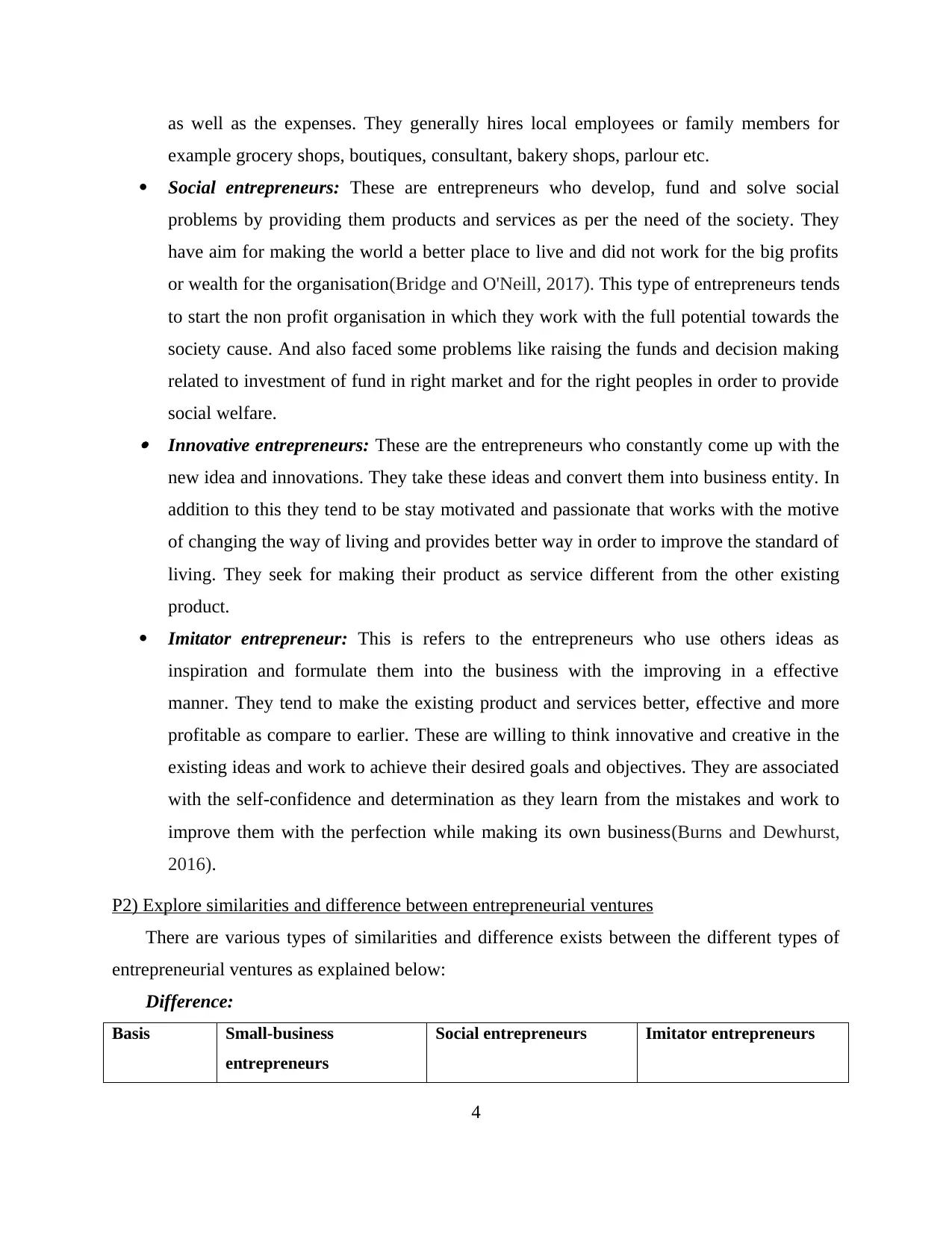
as well as the expenses. They generally hires local employees or family members for
example grocery shops, boutiques, consultant, bakery shops, parlour etc.
Social entrepreneurs: These are entrepreneurs who develop, fund and solve social
problems by providing them products and services as per the need of the society. They
have aim for making the world a better place to live and did not work for the big profits
or wealth for the organisation(Bridge and O'Neill, 2017). This type of entrepreneurs tends
to start the non profit organisation in which they work with the full potential towards the
society cause. And also faced some problems like raising the funds and decision making
related to investment of fund in right market and for the right peoples in order to provide
social welfare. Innovative entrepreneurs: These are the entrepreneurs who constantly come up with the
new idea and innovations. They take these ideas and convert them into business entity. In
addition to this they tend to be stay motivated and passionate that works with the motive
of changing the way of living and provides better way in order to improve the standard of
living. They seek for making their product as service different from the other existing
product.
Imitator entrepreneur: This is refers to the entrepreneurs who use others ideas as
inspiration and formulate them into the business with the improving in a effective
manner. They tend to make the existing product and services better, effective and more
profitable as compare to earlier. These are willing to think innovative and creative in the
existing ideas and work to achieve their desired goals and objectives. They are associated
with the self-confidence and determination as they learn from the mistakes and work to
improve them with the perfection while making its own business(Burns and Dewhurst,
2016).
P2) Explore similarities and difference between entrepreneurial ventures
There are various types of similarities and difference exists between the different types of
entrepreneurial ventures as explained below:
Difference:
Basis Small-business
entrepreneurs
Social entrepreneurs Imitator entrepreneurs
4
example grocery shops, boutiques, consultant, bakery shops, parlour etc.
Social entrepreneurs: These are entrepreneurs who develop, fund and solve social
problems by providing them products and services as per the need of the society. They
have aim for making the world a better place to live and did not work for the big profits
or wealth for the organisation(Bridge and O'Neill, 2017). This type of entrepreneurs tends
to start the non profit organisation in which they work with the full potential towards the
society cause. And also faced some problems like raising the funds and decision making
related to investment of fund in right market and for the right peoples in order to provide
social welfare. Innovative entrepreneurs: These are the entrepreneurs who constantly come up with the
new idea and innovations. They take these ideas and convert them into business entity. In
addition to this they tend to be stay motivated and passionate that works with the motive
of changing the way of living and provides better way in order to improve the standard of
living. They seek for making their product as service different from the other existing
product.
Imitator entrepreneur: This is refers to the entrepreneurs who use others ideas as
inspiration and formulate them into the business with the improving in a effective
manner. They tend to make the existing product and services better, effective and more
profitable as compare to earlier. These are willing to think innovative and creative in the
existing ideas and work to achieve their desired goals and objectives. They are associated
with the self-confidence and determination as they learn from the mistakes and work to
improve them with the perfection while making its own business(Burns and Dewhurst,
2016).
P2) Explore similarities and difference between entrepreneurial ventures
There are various types of similarities and difference exists between the different types of
entrepreneurial ventures as explained below:
Difference:
Basis Small-business
entrepreneurs
Social entrepreneurs Imitator entrepreneurs
4
Paraphrase This Document
Need a fresh take? Get an instant paraphrase of this document with our AI Paraphraser
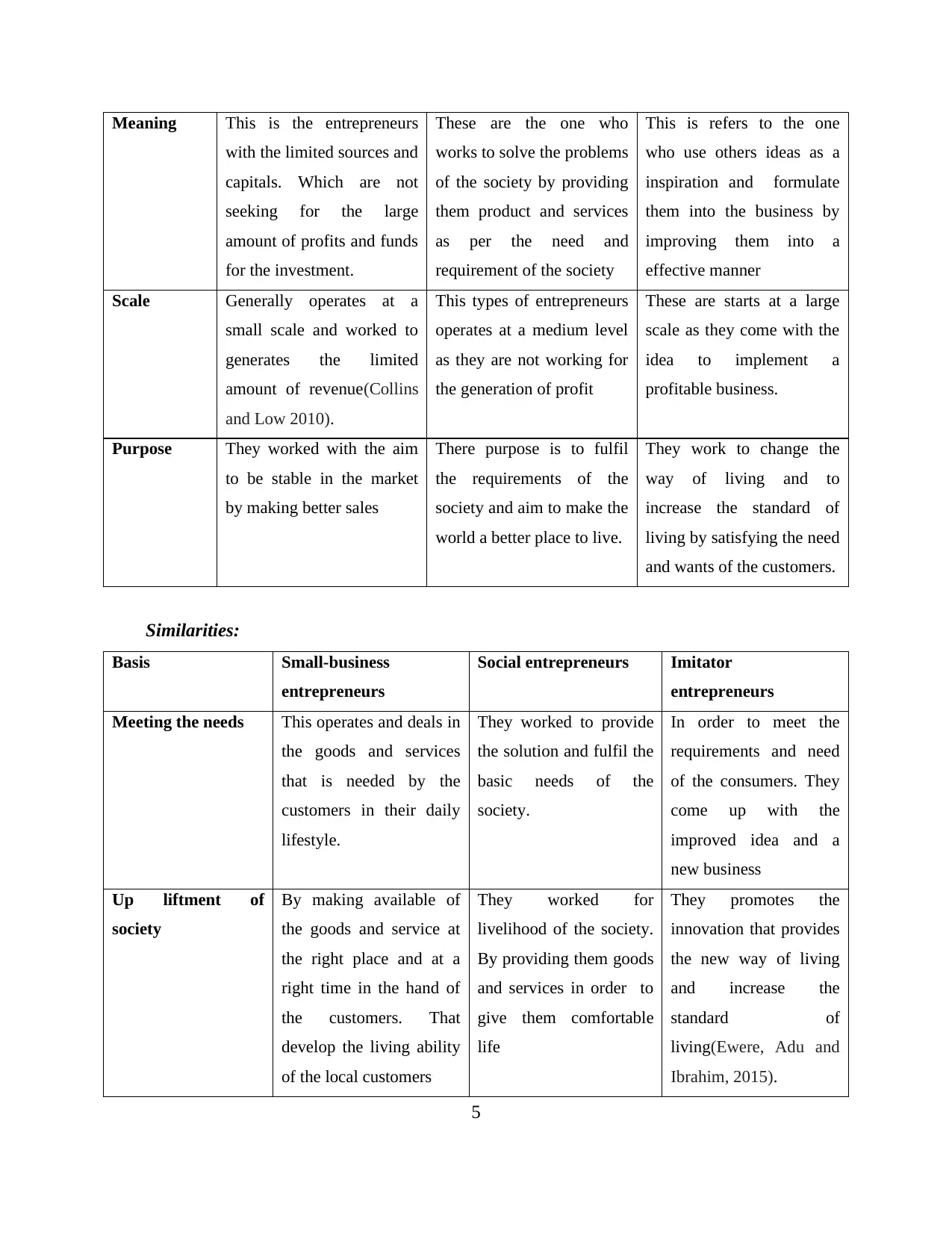
Meaning This is the entrepreneurs
with the limited sources and
capitals. Which are not
seeking for the large
amount of profits and funds
for the investment.
These are the one who
works to solve the problems
of the society by providing
them product and services
as per the need and
requirement of the society
This is refers to the one
who use others ideas as a
inspiration and formulate
them into the business by
improving them into a
effective manner
Scale Generally operates at a
small scale and worked to
generates the limited
amount of revenue(Collins
and Low 2010).
This types of entrepreneurs
operates at a medium level
as they are not working for
the generation of profit
These are starts at a large
scale as they come with the
idea to implement a
profitable business.
Purpose They worked with the aim
to be stable in the market
by making better sales
There purpose is to fulfil
the requirements of the
society and aim to make the
world a better place to live.
They work to change the
way of living and to
increase the standard of
living by satisfying the need
and wants of the customers.
Similarities:
Basis Small-business
entrepreneurs
Social entrepreneurs Imitator
entrepreneurs
Meeting the needs This operates and deals in
the goods and services
that is needed by the
customers in their daily
lifestyle.
They worked to provide
the solution and fulfil the
basic needs of the
society.
In order to meet the
requirements and need
of the consumers. They
come up with the
improved idea and a
new business
Up liftment of
society
By making available of
the goods and service at
the right place and at a
right time in the hand of
the customers. That
develop the living ability
of the local customers
They worked for
livelihood of the society.
By providing them goods
and services in order to
give them comfortable
life
They promotes the
innovation that provides
the new way of living
and increase the
standard of
living(Ewere, Adu and
Ibrahim, 2015).
5
with the limited sources and
capitals. Which are not
seeking for the large
amount of profits and funds
for the investment.
These are the one who
works to solve the problems
of the society by providing
them product and services
as per the need and
requirement of the society
This is refers to the one
who use others ideas as a
inspiration and formulate
them into the business by
improving them into a
effective manner
Scale Generally operates at a
small scale and worked to
generates the limited
amount of revenue(Collins
and Low 2010).
This types of entrepreneurs
operates at a medium level
as they are not working for
the generation of profit
These are starts at a large
scale as they come with the
idea to implement a
profitable business.
Purpose They worked with the aim
to be stable in the market
by making better sales
There purpose is to fulfil
the requirements of the
society and aim to make the
world a better place to live.
They work to change the
way of living and to
increase the standard of
living by satisfying the need
and wants of the customers.
Similarities:
Basis Small-business
entrepreneurs
Social entrepreneurs Imitator
entrepreneurs
Meeting the needs This operates and deals in
the goods and services
that is needed by the
customers in their daily
lifestyle.
They worked to provide
the solution and fulfil the
basic needs of the
society.
In order to meet the
requirements and need
of the consumers. They
come up with the
improved idea and a
new business
Up liftment of
society
By making available of
the goods and service at
the right place and at a
right time in the hand of
the customers. That
develop the living ability
of the local customers
They worked for
livelihood of the society.
By providing them goods
and services in order to
give them comfortable
life
They promotes the
innovation that provides
the new way of living
and increase the
standard of
living(Ewere, Adu and
Ibrahim, 2015).
5
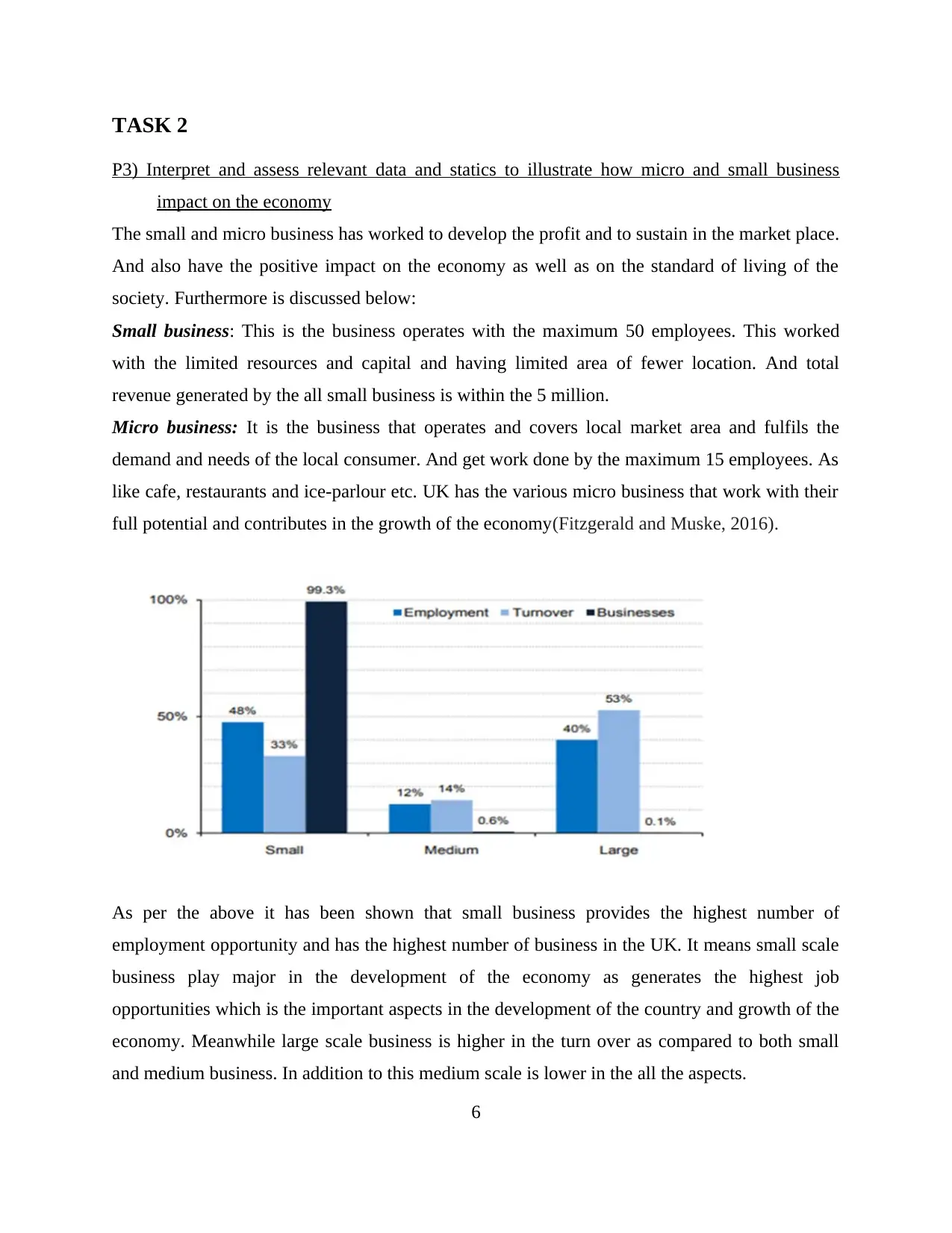
TASK 2
P3) Interpret and assess relevant data and statics to illustrate how micro and small business
impact on the economy
The small and micro business has worked to develop the profit and to sustain in the market place.
And also have the positive impact on the economy as well as on the standard of living of the
society. Furthermore is discussed below:
Small business: This is the business operates with the maximum 50 employees. This worked
with the limited resources and capital and having limited area of fewer location. And total
revenue generated by the all small business is within the 5 million.
Micro business: It is the business that operates and covers local market area and fulfils the
demand and needs of the local consumer. And get work done by the maximum 15 employees. As
like cafe, restaurants and ice-parlour etc. UK has the various micro business that work with their
full potential and contributes in the growth of the economy(Fitzgerald and Muske, 2016).
As per the above it has been shown that small business provides the highest number of
employment opportunity and has the highest number of business in the UK. It means small scale
business play major in the development of the economy as generates the highest job
opportunities which is the important aspects in the development of the country and growth of the
economy. Meanwhile large scale business is higher in the turn over as compared to both small
and medium business. In addition to this medium scale is lower in the all the aspects.
6
P3) Interpret and assess relevant data and statics to illustrate how micro and small business
impact on the economy
The small and micro business has worked to develop the profit and to sustain in the market place.
And also have the positive impact on the economy as well as on the standard of living of the
society. Furthermore is discussed below:
Small business: This is the business operates with the maximum 50 employees. This worked
with the limited resources and capital and having limited area of fewer location. And total
revenue generated by the all small business is within the 5 million.
Micro business: It is the business that operates and covers local market area and fulfils the
demand and needs of the local consumer. And get work done by the maximum 15 employees. As
like cafe, restaurants and ice-parlour etc. UK has the various micro business that work with their
full potential and contributes in the growth of the economy(Fitzgerald and Muske, 2016).
As per the above it has been shown that small business provides the highest number of
employment opportunity and has the highest number of business in the UK. It means small scale
business play major in the development of the economy as generates the highest job
opportunities which is the important aspects in the development of the country and growth of the
economy. Meanwhile large scale business is higher in the turn over as compared to both small
and medium business. In addition to this medium scale is lower in the all the aspects.
6
⊘ This is a preview!⊘
Do you want full access?
Subscribe today to unlock all pages.

Trusted by 1+ million students worldwide
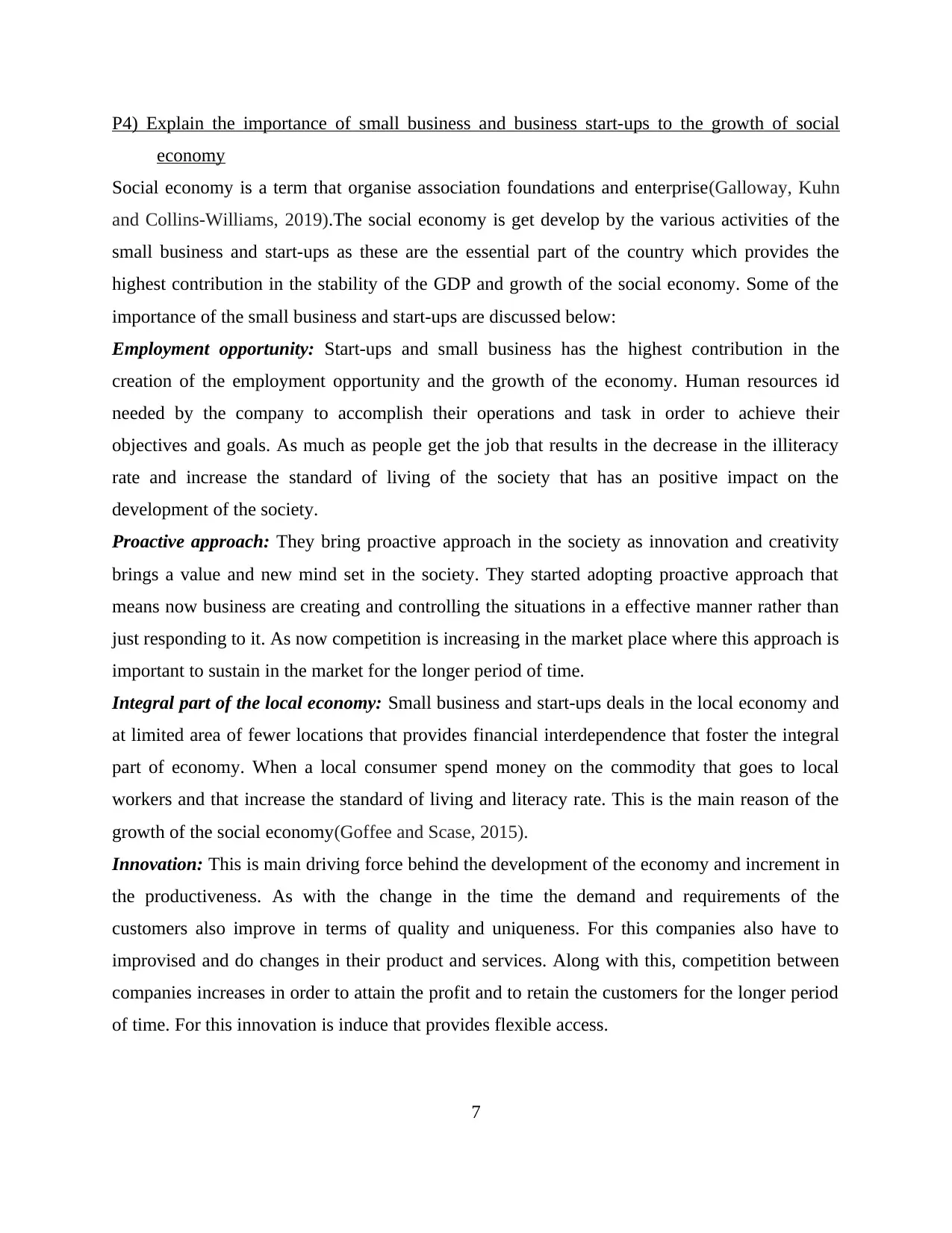
P4) Explain the importance of small business and business start-ups to the growth of social
economy
Social economy is a term that organise association foundations and enterprise(Galloway, Kuhn
and Collins-Williams, 2019).The social economy is get develop by the various activities of the
small business and start-ups as these are the essential part of the country which provides the
highest contribution in the stability of the GDP and growth of the social economy. Some of the
importance of the small business and start-ups are discussed below:
Employment opportunity: Start-ups and small business has the highest contribution in the
creation of the employment opportunity and the growth of the economy. Human resources id
needed by the company to accomplish their operations and task in order to achieve their
objectives and goals. As much as people get the job that results in the decrease in the illiteracy
rate and increase the standard of living of the society that has an positive impact on the
development of the society.
Proactive approach: They bring proactive approach in the society as innovation and creativity
brings a value and new mind set in the society. They started adopting proactive approach that
means now business are creating and controlling the situations in a effective manner rather than
just responding to it. As now competition is increasing in the market place where this approach is
important to sustain in the market for the longer period of time.
Integral part of the local economy: Small business and start-ups deals in the local economy and
at limited area of fewer locations that provides financial interdependence that foster the integral
part of economy. When a local consumer spend money on the commodity that goes to local
workers and that increase the standard of living and literacy rate. This is the main reason of the
growth of the social economy(Goffee and Scase, 2015).
Innovation: This is main driving force behind the development of the economy and increment in
the productiveness. As with the change in the time the demand and requirements of the
customers also improve in terms of quality and uniqueness. For this companies also have to
improvised and do changes in their product and services. Along with this, competition between
companies increases in order to attain the profit and to retain the customers for the longer period
of time. For this innovation is induce that provides flexible access.
7
economy
Social economy is a term that organise association foundations and enterprise(Galloway, Kuhn
and Collins-Williams, 2019).The social economy is get develop by the various activities of the
small business and start-ups as these are the essential part of the country which provides the
highest contribution in the stability of the GDP and growth of the social economy. Some of the
importance of the small business and start-ups are discussed below:
Employment opportunity: Start-ups and small business has the highest contribution in the
creation of the employment opportunity and the growth of the economy. Human resources id
needed by the company to accomplish their operations and task in order to achieve their
objectives and goals. As much as people get the job that results in the decrease in the illiteracy
rate and increase the standard of living of the society that has an positive impact on the
development of the society.
Proactive approach: They bring proactive approach in the society as innovation and creativity
brings a value and new mind set in the society. They started adopting proactive approach that
means now business are creating and controlling the situations in a effective manner rather than
just responding to it. As now competition is increasing in the market place where this approach is
important to sustain in the market for the longer period of time.
Integral part of the local economy: Small business and start-ups deals in the local economy and
at limited area of fewer locations that provides financial interdependence that foster the integral
part of economy. When a local consumer spend money on the commodity that goes to local
workers and that increase the standard of living and literacy rate. This is the main reason of the
growth of the social economy(Goffee and Scase, 2015).
Innovation: This is main driving force behind the development of the economy and increment in
the productiveness. As with the change in the time the demand and requirements of the
customers also improve in terms of quality and uniqueness. For this companies also have to
improvised and do changes in their product and services. Along with this, competition between
companies increases in order to attain the profit and to retain the customers for the longer period
of time. For this innovation is induce that provides flexible access.
7
Paraphrase This Document
Need a fresh take? Get an instant paraphrase of this document with our AI Paraphraser
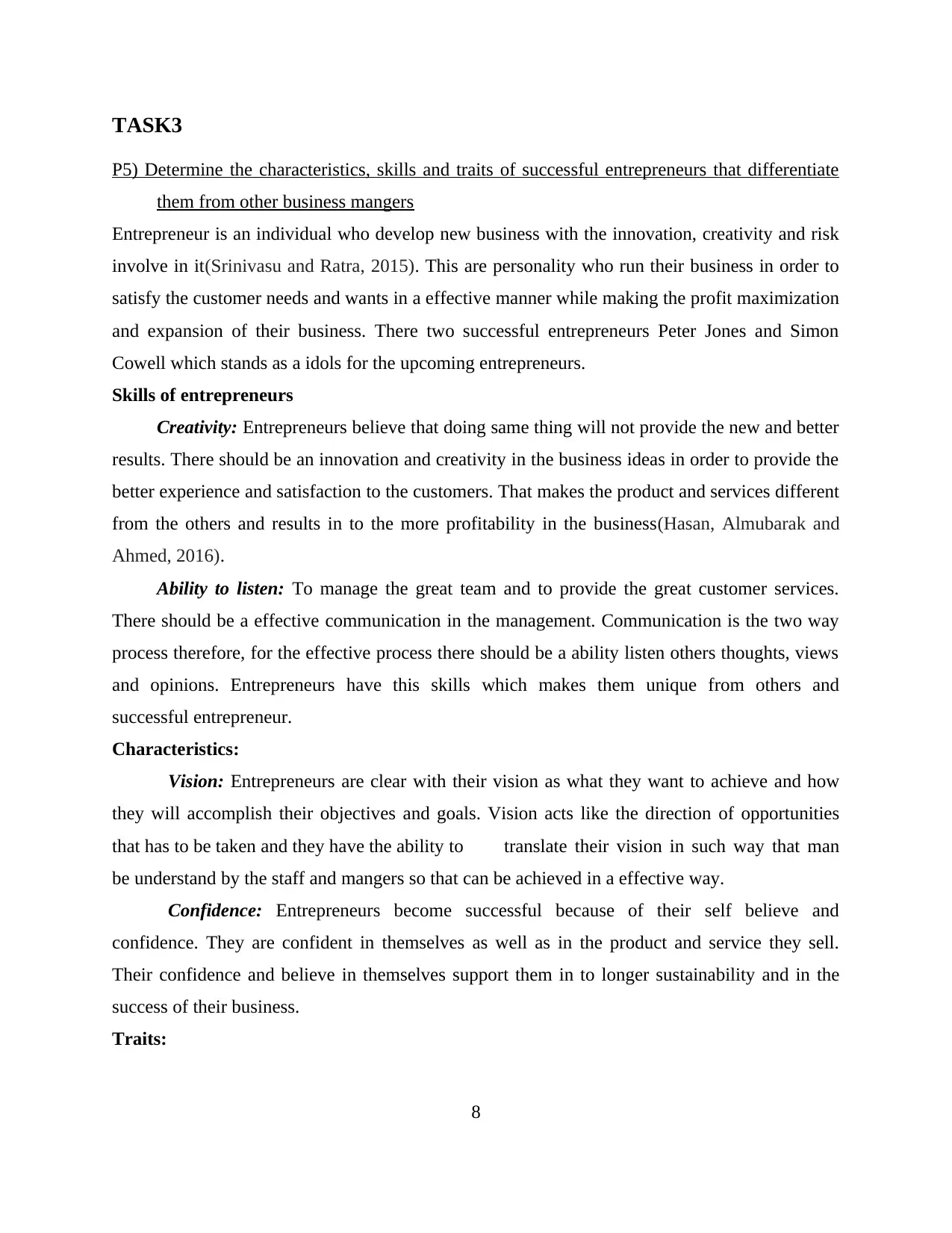
TASK3
P5) Determine the characteristics, skills and traits of successful entrepreneurs that differentiate
them from other business mangers
Entrepreneur is an individual who develop new business with the innovation, creativity and risk
involve in it(Srinivasu and Ratra, 2015). This are personality who run their business in order to
satisfy the customer needs and wants in a effective manner while making the profit maximization
and expansion of their business. There two successful entrepreneurs Peter Jones and Simon
Cowell which stands as a idols for the upcoming entrepreneurs.
Skills of entrepreneurs
Creativity: Entrepreneurs believe that doing same thing will not provide the new and better
results. There should be an innovation and creativity in the business ideas in order to provide the
better experience and satisfaction to the customers. That makes the product and services different
from the others and results in to the more profitability in the business(Hasan, Almubarak and
Ahmed, 2016).
Ability to listen: To manage the great team and to provide the great customer services.
There should be a effective communication in the management. Communication is the two way
process therefore, for the effective process there should be a ability listen others thoughts, views
and opinions. Entrepreneurs have this skills which makes them unique from others and
successful entrepreneur.
Characteristics:
Vision: Entrepreneurs are clear with their vision as what they want to achieve and how
they will accomplish their objectives and goals. Vision acts like the direction of opportunities
that has to be taken and they have the ability to translate their vision in such way that man
be understand by the staff and mangers so that can be achieved in a effective way.
Confidence: Entrepreneurs become successful because of their self believe and
confidence. They are confident in themselves as well as in the product and service they sell.
Their confidence and believe in themselves support them in to longer sustainability and in the
success of their business.
Traits:
8
P5) Determine the characteristics, skills and traits of successful entrepreneurs that differentiate
them from other business mangers
Entrepreneur is an individual who develop new business with the innovation, creativity and risk
involve in it(Srinivasu and Ratra, 2015). This are personality who run their business in order to
satisfy the customer needs and wants in a effective manner while making the profit maximization
and expansion of their business. There two successful entrepreneurs Peter Jones and Simon
Cowell which stands as a idols for the upcoming entrepreneurs.
Skills of entrepreneurs
Creativity: Entrepreneurs believe that doing same thing will not provide the new and better
results. There should be an innovation and creativity in the business ideas in order to provide the
better experience and satisfaction to the customers. That makes the product and services different
from the others and results in to the more profitability in the business(Hasan, Almubarak and
Ahmed, 2016).
Ability to listen: To manage the great team and to provide the great customer services.
There should be a effective communication in the management. Communication is the two way
process therefore, for the effective process there should be a ability listen others thoughts, views
and opinions. Entrepreneurs have this skills which makes them unique from others and
successful entrepreneur.
Characteristics:
Vision: Entrepreneurs are clear with their vision as what they want to achieve and how
they will accomplish their objectives and goals. Vision acts like the direction of opportunities
that has to be taken and they have the ability to translate their vision in such way that man
be understand by the staff and mangers so that can be achieved in a effective way.
Confidence: Entrepreneurs become successful because of their self believe and
confidence. They are confident in themselves as well as in the product and service they sell.
Their confidence and believe in themselves support them in to longer sustainability and in the
success of their business.
Traits:
8
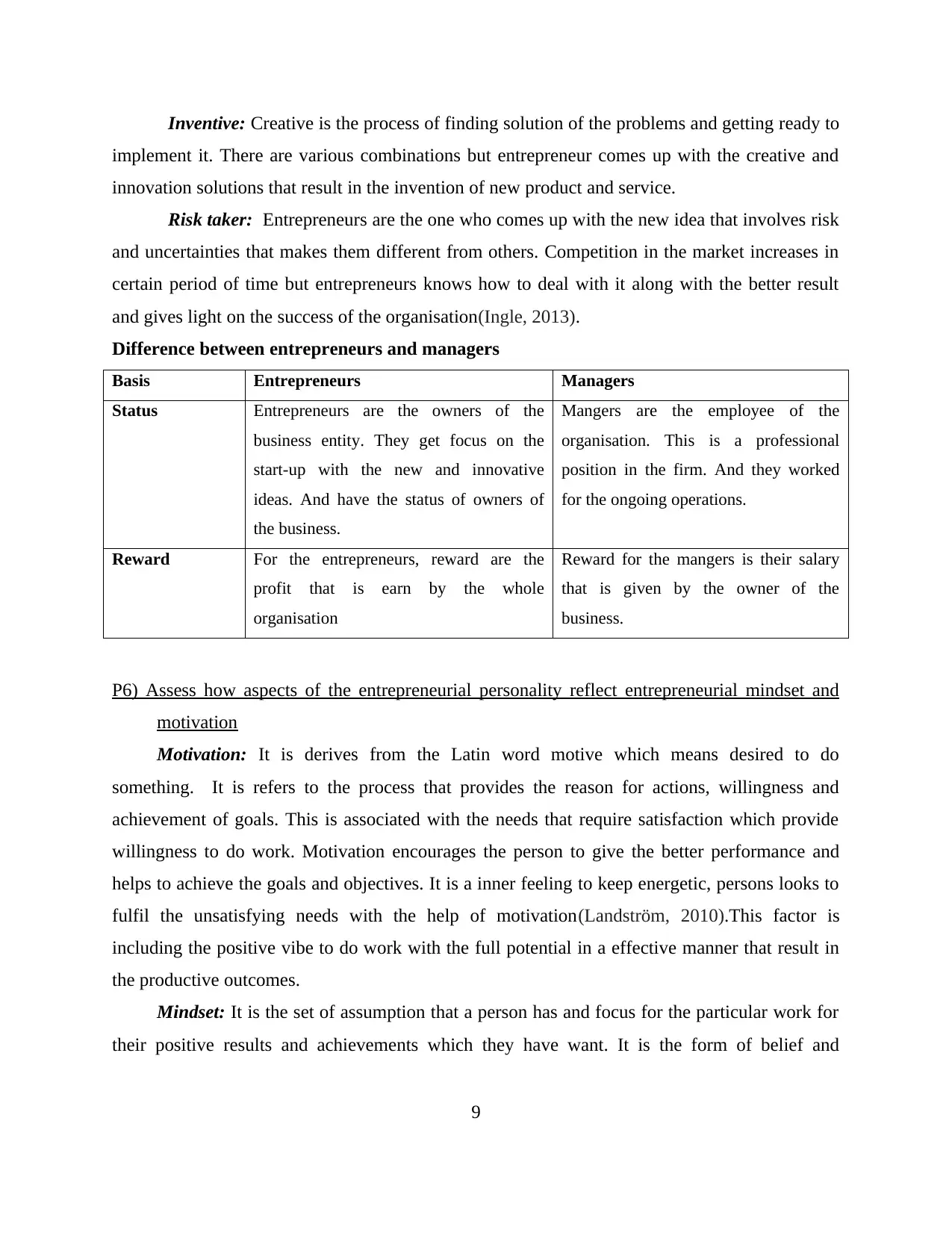
Inventive: Creative is the process of finding solution of the problems and getting ready to
implement it. There are various combinations but entrepreneur comes up with the creative and
innovation solutions that result in the invention of new product and service.
Risk taker: Entrepreneurs are the one who comes up with the new idea that involves risk
and uncertainties that makes them different from others. Competition in the market increases in
certain period of time but entrepreneurs knows how to deal with it along with the better result
and gives light on the success of the organisation(Ingle, 2013).
Difference between entrepreneurs and managers
Basis Entrepreneurs Managers
Status Entrepreneurs are the owners of the
business entity. They get focus on the
start-up with the new and innovative
ideas. And have the status of owners of
the business.
Mangers are the employee of the
organisation. This is a professional
position in the firm. And they worked
for the ongoing operations.
Reward For the entrepreneurs, reward are the
profit that is earn by the whole
organisation
Reward for the mangers is their salary
that is given by the owner of the
business.
P6) Assess how aspects of the entrepreneurial personality reflect entrepreneurial mindset and
motivation
Motivation: It is derives from the Latin word motive which means desired to do
something. It is refers to the process that provides the reason for actions, willingness and
achievement of goals. This is associated with the needs that require satisfaction which provide
willingness to do work. Motivation encourages the person to give the better performance and
helps to achieve the goals and objectives. It is a inner feeling to keep energetic, persons looks to
fulfil the unsatisfying needs with the help of motivation(Landström, 2010).This factor is
including the positive vibe to do work with the full potential in a effective manner that result in
the productive outcomes.
Mindset: It is the set of assumption that a person has and focus for the particular work for
their positive results and achievements which they have want. It is the form of belief and
9
implement it. There are various combinations but entrepreneur comes up with the creative and
innovation solutions that result in the invention of new product and service.
Risk taker: Entrepreneurs are the one who comes up with the new idea that involves risk
and uncertainties that makes them different from others. Competition in the market increases in
certain period of time but entrepreneurs knows how to deal with it along with the better result
and gives light on the success of the organisation(Ingle, 2013).
Difference between entrepreneurs and managers
Basis Entrepreneurs Managers
Status Entrepreneurs are the owners of the
business entity. They get focus on the
start-up with the new and innovative
ideas. And have the status of owners of
the business.
Mangers are the employee of the
organisation. This is a professional
position in the firm. And they worked
for the ongoing operations.
Reward For the entrepreneurs, reward are the
profit that is earn by the whole
organisation
Reward for the mangers is their salary
that is given by the owner of the
business.
P6) Assess how aspects of the entrepreneurial personality reflect entrepreneurial mindset and
motivation
Motivation: It is derives from the Latin word motive which means desired to do
something. It is refers to the process that provides the reason for actions, willingness and
achievement of goals. This is associated with the needs that require satisfaction which provide
willingness to do work. Motivation encourages the person to give the better performance and
helps to achieve the goals and objectives. It is a inner feeling to keep energetic, persons looks to
fulfil the unsatisfying needs with the help of motivation(Landström, 2010).This factor is
including the positive vibe to do work with the full potential in a effective manner that result in
the productive outcomes.
Mindset: It is the set of assumption that a person has and focus for the particular work for
their positive results and achievements which they have want. It is the form of belief and
9
⊘ This is a preview!⊘
Do you want full access?
Subscribe today to unlock all pages.

Trusted by 1+ million students worldwide
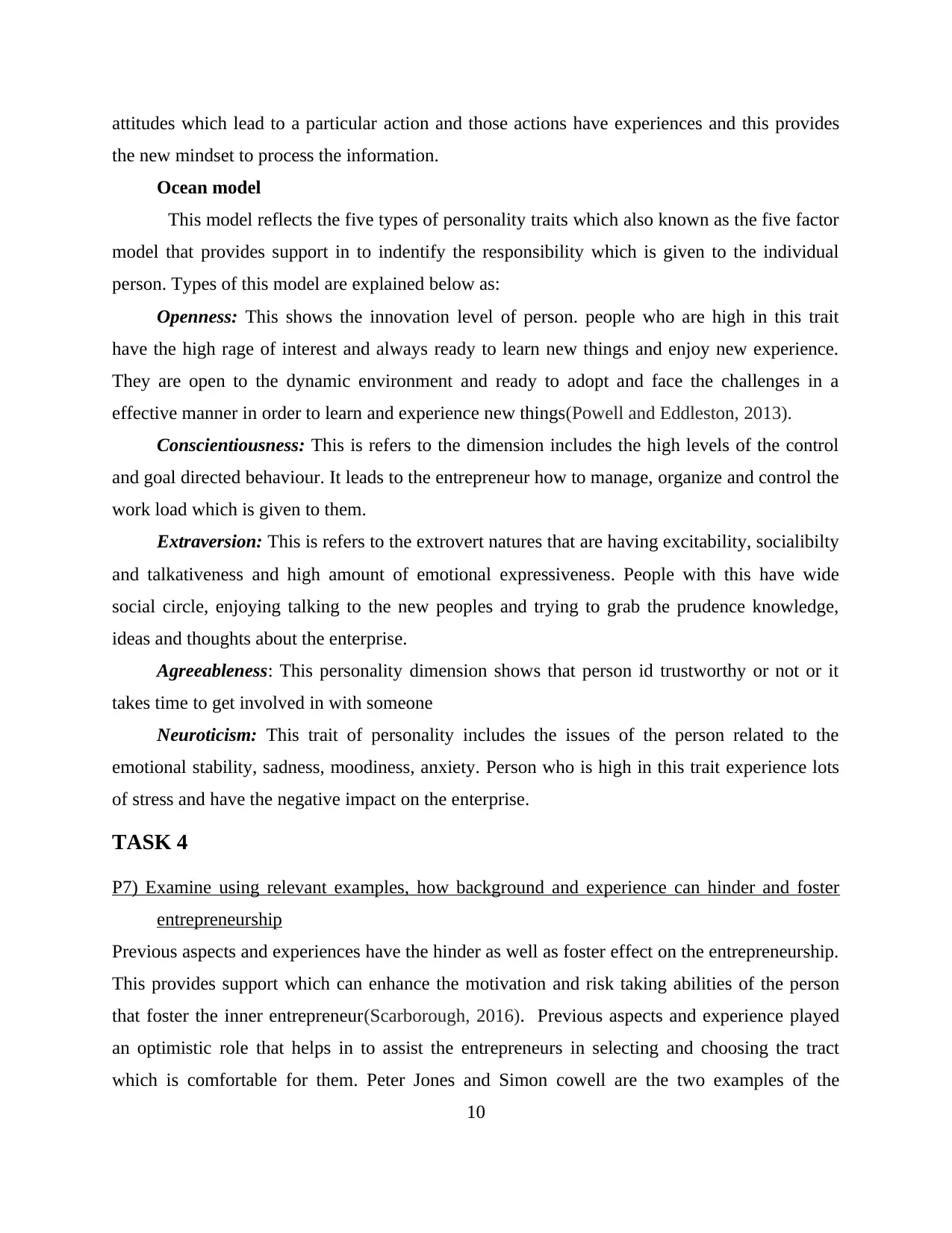
attitudes which lead to a particular action and those actions have experiences and this provides
the new mindset to process the information.
Ocean model
This model reflects the five types of personality traits which also known as the five factor
model that provides support in to indentify the responsibility which is given to the individual
person. Types of this model are explained below as:
Openness: This shows the innovation level of person. people who are high in this trait
have the high rage of interest and always ready to learn new things and enjoy new experience.
They are open to the dynamic environment and ready to adopt and face the challenges in a
effective manner in order to learn and experience new things(Powell and Eddleston, 2013).
Conscientiousness: This is refers to the dimension includes the high levels of the control
and goal directed behaviour. It leads to the entrepreneur how to manage, organize and control the
work load which is given to them.
Extraversion: This is refers to the extrovert natures that are having excitability, socialibilty
and talkativeness and high amount of emotional expressiveness. People with this have wide
social circle, enjoying talking to the new peoples and trying to grab the prudence knowledge,
ideas and thoughts about the enterprise.
Agreeableness: This personality dimension shows that person id trustworthy or not or it
takes time to get involved in with someone
Neuroticism: This trait of personality includes the issues of the person related to the
emotional stability, sadness, moodiness, anxiety. Person who is high in this trait experience lots
of stress and have the negative impact on the enterprise.
TASK 4
P7) Examine using relevant examples, how background and experience can hinder and foster
entrepreneurship
Previous aspects and experiences have the hinder as well as foster effect on the entrepreneurship.
This provides support which can enhance the motivation and risk taking abilities of the person
that foster the inner entrepreneur(Scarborough, 2016). Previous aspects and experience played
an optimistic role that helps in to assist the entrepreneurs in selecting and choosing the tract
which is comfortable for them. Peter Jones and Simon cowell are the two examples of the
10
the new mindset to process the information.
Ocean model
This model reflects the five types of personality traits which also known as the five factor
model that provides support in to indentify the responsibility which is given to the individual
person. Types of this model are explained below as:
Openness: This shows the innovation level of person. people who are high in this trait
have the high rage of interest and always ready to learn new things and enjoy new experience.
They are open to the dynamic environment and ready to adopt and face the challenges in a
effective manner in order to learn and experience new things(Powell and Eddleston, 2013).
Conscientiousness: This is refers to the dimension includes the high levels of the control
and goal directed behaviour. It leads to the entrepreneur how to manage, organize and control the
work load which is given to them.
Extraversion: This is refers to the extrovert natures that are having excitability, socialibilty
and talkativeness and high amount of emotional expressiveness. People with this have wide
social circle, enjoying talking to the new peoples and trying to grab the prudence knowledge,
ideas and thoughts about the enterprise.
Agreeableness: This personality dimension shows that person id trustworthy or not or it
takes time to get involved in with someone
Neuroticism: This trait of personality includes the issues of the person related to the
emotional stability, sadness, moodiness, anxiety. Person who is high in this trait experience lots
of stress and have the negative impact on the enterprise.
TASK 4
P7) Examine using relevant examples, how background and experience can hinder and foster
entrepreneurship
Previous aspects and experiences have the hinder as well as foster effect on the entrepreneurship.
This provides support which can enhance the motivation and risk taking abilities of the person
that foster the inner entrepreneur(Scarborough, 2016). Previous aspects and experience played
an optimistic role that helps in to assist the entrepreneurs in selecting and choosing the tract
which is comfortable for them. Peter Jones and Simon cowell are the two examples of the
10
Paraphrase This Document
Need a fresh take? Get an instant paraphrase of this document with our AI Paraphraser
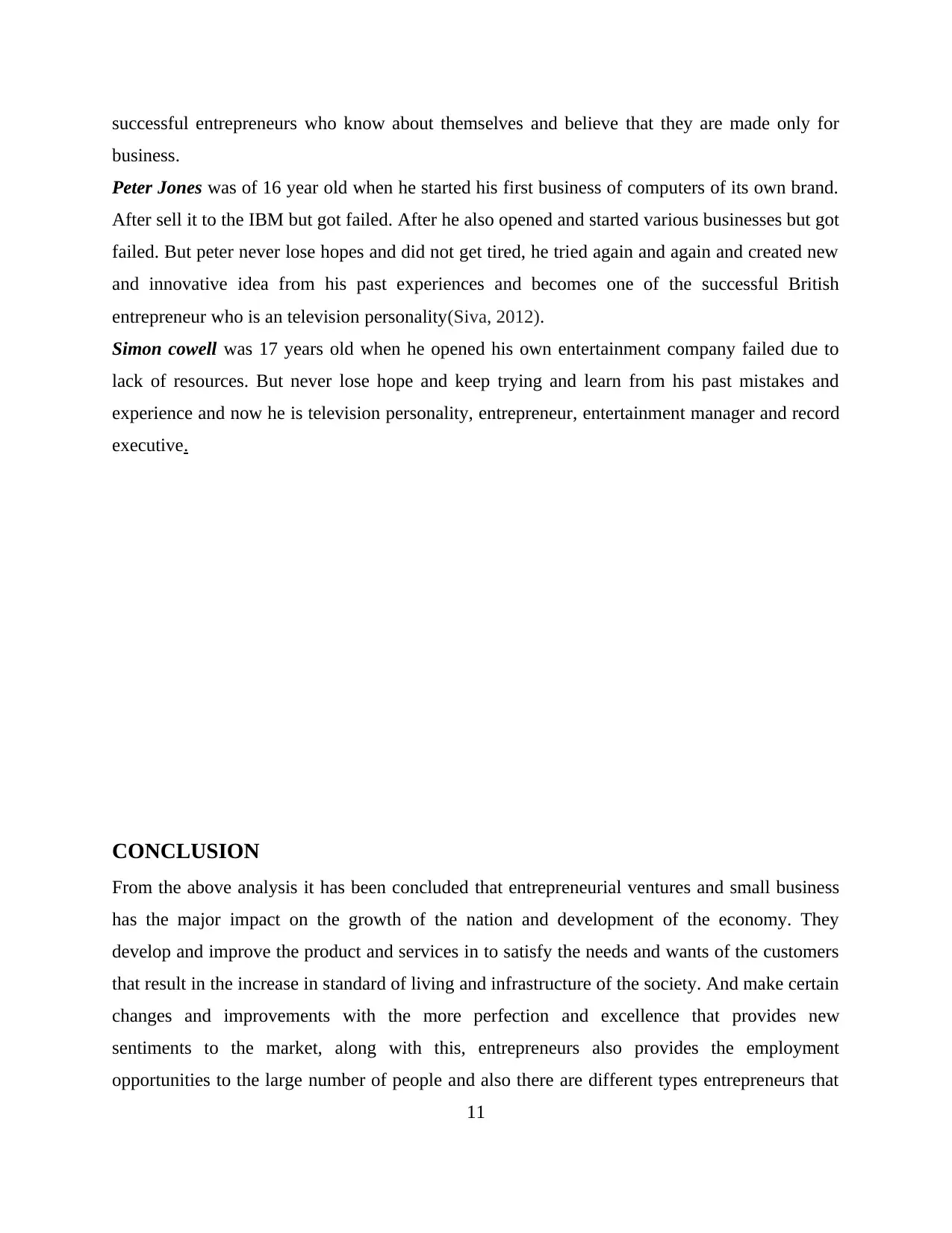
successful entrepreneurs who know about themselves and believe that they are made only for
business.
Peter Jones was of 16 year old when he started his first business of computers of its own brand.
After sell it to the IBM but got failed. After he also opened and started various businesses but got
failed. But peter never lose hopes and did not get tired, he tried again and again and created new
and innovative idea from his past experiences and becomes one of the successful British
entrepreneur who is an television personality(Siva, 2012).
Simon cowell was 17 years old when he opened his own entertainment company failed due to
lack of resources. But never lose hope and keep trying and learn from his past mistakes and
experience and now he is television personality, entrepreneur, entertainment manager and record
executive.
CONCLUSION
From the above analysis it has been concluded that entrepreneurial ventures and small business
has the major impact on the growth of the nation and development of the economy. They
develop and improve the product and services in to satisfy the needs and wants of the customers
that result in the increase in standard of living and infrastructure of the society. And make certain
changes and improvements with the more perfection and excellence that provides new
sentiments to the market, along with this, entrepreneurs also provides the employment
opportunities to the large number of people and also there are different types entrepreneurs that
11
business.
Peter Jones was of 16 year old when he started his first business of computers of its own brand.
After sell it to the IBM but got failed. After he also opened and started various businesses but got
failed. But peter never lose hopes and did not get tired, he tried again and again and created new
and innovative idea from his past experiences and becomes one of the successful British
entrepreneur who is an television personality(Siva, 2012).
Simon cowell was 17 years old when he opened his own entertainment company failed due to
lack of resources. But never lose hope and keep trying and learn from his past mistakes and
experience and now he is television personality, entrepreneur, entertainment manager and record
executive.
CONCLUSION
From the above analysis it has been concluded that entrepreneurial ventures and small business
has the major impact on the growth of the nation and development of the economy. They
develop and improve the product and services in to satisfy the needs and wants of the customers
that result in the increase in standard of living and infrastructure of the society. And make certain
changes and improvements with the more perfection and excellence that provides new
sentiments to the market, along with this, entrepreneurs also provides the employment
opportunities to the large number of people and also there are different types entrepreneurs that
11

work for the betterment of the society in their own unique way. In addition to this they have such
characteristics and skills which make them different form the other managers. Background of the
entrepreneurship has the various aspiration that motivates, hinder and foster the mindset of the
entrepreneurs to take risk to do something new.
REFERENCES
Books and Journals
12
characteristics and skills which make them different form the other managers. Background of the
entrepreneurship has the various aspiration that motivates, hinder and foster the mindset of the
entrepreneurs to take risk to do something new.
REFERENCES
Books and Journals
12
⊘ This is a preview!⊘
Do you want full access?
Subscribe today to unlock all pages.

Trusted by 1+ million students worldwide
1 out of 14
Related Documents
Your All-in-One AI-Powered Toolkit for Academic Success.
+13062052269
info@desklib.com
Available 24*7 on WhatsApp / Email
![[object Object]](/_next/static/media/star-bottom.7253800d.svg)
Unlock your academic potential
Copyright © 2020–2026 A2Z Services. All Rights Reserved. Developed and managed by ZUCOL.
![Entrepreneurship and Small Business Impact Report - [University Name]](/_next/image/?url=https%3A%2F%2Fdesklib.com%2Fmedia%2Fimages%2Fwj%2Fd1f42599211847658d3fd556aa563fa5.jpg&w=256&q=75)




